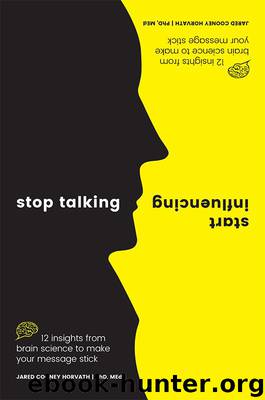Stop Talking, Start Influencing by Jared Cooney Horvath

Author:Jared Cooney Horvath
Language: eng
Format: epub
Publisher: Exisle Publishing Pty Ltd
2. Use misconceptions to boost learning
When people receive new information without first activating a mental model and generating a prediction, they come to understand that information in isolation without connecting it to previously learnt concepts or ideas. For instance, had I simply said ‘Bulls are dichromatic’ this fact might never have become tied to or influence the relevant mental model and you’d likely still believe that bulls hate the colour red.
However, when people activate a mental model and generate a prediction prior to receiving new information, they come to interpret that information through their current understanding. By first leading you to predict that bulls hate the colour red, I was ensuring that the relevant mental model was activated. Later, when you learnt that ‘Bulls are dichromatic’ you were able to incorporate this information into your existing mental model and update accordingly.
Rather than avoiding common mistakes or misconceptions, try to embed them within your sessions. Prior to a presentation, ask people to discuss what they currently understand about a particular topic; conduct a demonstration meant to contradict common assumptions (such as dropping two differently weighted balls and guessing which will hit the ground first); or deliver a multiple-choice pre-quiz that includes typical misunderstandings in the answer choices. Only when a mental model is active and a prediction made will new ideas be linked to old and updating occur.
BURNING QUESTION 2:
HYPERCORRECTION
‘Why do I remember some error fixes (elephants only have two knees, for example) but quickly forget others?’
Researchers call this phenomenon hypercorrection and it largely boils down to confidence.
When we have only a basic understanding of a particular topic, our mental models will be quite weak and we’ll have little confidence in our predictions. As an example, what is my favourite sport? Though you’ve probably gleaned enough information throughout this book to make a guess (‘He references golf quite a bit, so I’ll guess that’), you wouldn’t bet money on this prediction. As such, when I reveal that my favourite sport is ice hockey, no error alarm will be triggered, curiosity will be minimal and you won’t feel any pressing need to engage with the error-analysis cycle. This means if I ask you this same question next week, you’ll likely make the same incorrect prediction (‘Golf?’).
Conversely, when we have a deep understanding of a particular topic, our mental models will be quite strong and we’ll have high confidence in our predictions. As an example, how were witches traditionally executed during the Salem witch trials? You have probably come across this story many times in the past, so will feel quite confident in your prediction (‘They were burned at the stake’). As such, when I reveal that no witch was ever burned in Salem, your error alarm will ring loudly, your curiosity will pique and you will feel deeply compelled to update your mental model (they were hanged). If I ask you this same question next week, you’re likely to recall this error and make the correct prediction.
Of course, this all hinges upon your willingness to engage with the error.
Download
This site does not store any files on its server. We only index and link to content provided by other sites. Please contact the content providers to delete copyright contents if any and email us, we'll remove relevant links or contents immediately.
The Art of Coaching Workbook by Elena Aguilar(48067)
Trainspotting by Irvine Welsh(20058)
Twilight of the Idols With the Antichrist and Ecce Homo by Friedrich Nietzsche(17707)
Fangirl by Rainbow Rowell(7835)
Periodization Training for Sports by Tudor Bompa(7330)
Change Your Questions, Change Your Life by Marilee Adams(6646)
This Is How You Lose Her by Junot Diaz(5777)
Grit by Angela Duckworth(4739)
Red Sparrow by Jason Matthews(4670)
Asking the Right Questions: A Guide to Critical Thinking by M. Neil Browne & Stuart M. Keeley(4579)
Paper Towns by Green John(4171)
Room 212 by Kate Stewart(4108)
Ken Follett - World without end by Ken Follett(3975)
The Sports Rules Book by Human Kinetics(3590)
Housekeeping by Marilynne Robinson(3403)
The Motorcycle Diaries by Ernesto Che Guevara(3337)
Introduction to Kinesiology by Shirl J. Hoffman(3303)
Exercise Technique Manual for Resistance Training by National Strength & Conditioning Association(3292)
Double Down (Diary of a Wimpy Kid Book 11) by Jeff Kinney(3276)
